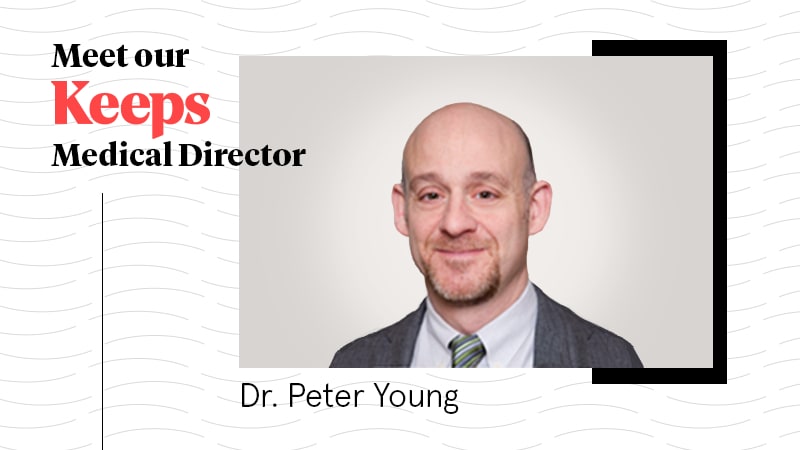Meet Keeps Medical Director: Dr. Peter Young

Do you know what it’s like to start losing your hair at just 18? If you’re reading this right now, chances are good that you do—but even if your mane didn’t start to fade until you were in your twenties or thirties, you know how crushing it can be to watch hair loss happen and feel like there’s nothing you can do about it.
It was that feeling (and wanting to help other people avoid it) that inspired Dr. Peter Young to become a dermatologist, hair loss expert, and medical director of Keeps. Here’s everything you need to know about Dr. Young, in his own words.
Can you tell us a bit about yourself and your educational background?
I am a board-certified dermatologist practicing in Massachusetts. Prior to moving to Massachusetts in 2000, I served as a physician in the U.S. Army for nine years.
After receiving my medical degree from Albany Medical College in Albany, New York, I completed my dermatology residency at Walter Reed Army Medical Center in Washington, DC. I then served as Chief of Dermatology at Fort Bragg in North Carolina prior to moving to Massachusetts.
In addition to published medical articles on various topics, I’ve been invited to speak at national medical meetings on teledermatology. I am a fellow of the American Academy of Dermatology and a member of the Massachusetts Medical Society.
On a personal note, I live in Westborough, Massachusetts with my wife and two sons. I am an avid runner, and have completed two marathons.
What inspired you to get into treating hair loss?
I started losing my hair at the tender age of 18. This was before finasteride and minoxidil came out, and there were really no available treatments, so I felt hopeless as I lost most of my hair. This inspired me to want to help people keep their hair.
What do you like most about treating people for hair loss?
I really enjoy watching my patients gain self-confidence and improve their quality of life as their hair loss improves.
What’s your favorite fun fact about hair or hair loss?
The average number of hairs on the human scalp is 100,000, and the entire adult body has around 5 million!
What’s the most common question you get from patients? How do you answer it?
Patients most commonly ask – what can I do to keep my hair?
I tell them that the combination of oral finasteride and 5% topical minoxidil is the most effective treatment for male pattern hair loss and that starting treatment early and using consistently is important to achieve desired results.
What advice would you give to someone who’s just started noticing hair loss?
Start treating your hair loss early. The sooner you start, the more likely you are to see results and keep your hair.